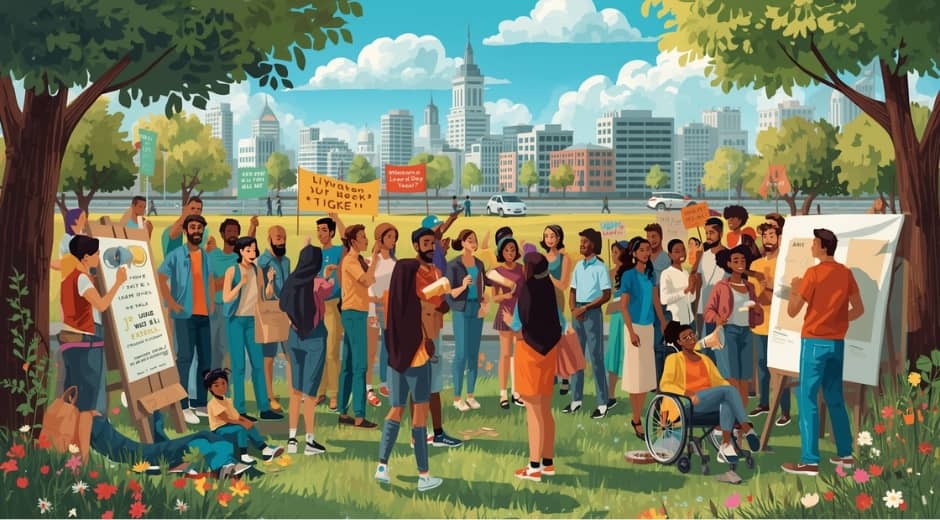Youth-Led Civic Engagement: The Power of Participatory Budgeting
Youth-Led Civic Engagement: The Power of Participatory Budgeting
Youth-Led Civic Engagement: The Power of Participatory Budgeting demonstrates how young people can play a meaningful role in shaping local government decisions. Across cities around the world, programs are emerging to give youth a direct voice in determining how public funds are spent, encouraging responsibility, leadership, and active involvement in the community. One notable example is Boston’s Youth Lead the Change initiative, which allows students to propose and vote on projects that impact their neighborhoods. Such programs illustrate the power of engagement when young people are trusted with real decision-making authority.
Increasingly, youth participation in civic processes has become a priority for governments and organizations looking to foster long-term social development. Encouraging young people to participate not only helps them build essential life skills but also ensures that policies and community projects reflect diverse perspectives and innovative solutions.
Understanding Participatory Budgeting
Participatory budgeting, at its core, is a process that empowers residents to decide how to allocate portions of a municipal or organizational budget. Traditionally, this process has been dominated by elected officials or adults with established positions in the community. By including youth, cities not only ensure the next generation is heard, but they also cultivate a sense of ownership and accountability in public life. When young people see that their voices influence tangible changes—like new parks, improved school facilities, or community centers—they develop an early understanding of governance and democratic responsibility.
Moreover, participatory budgeting allows youth to witness the complexities of decision-making, such as negotiating limited resources, prioritizing projects, and considering the long-term impacts of community investments. This hands-on learning complements theoretical knowledge and demonstrates that civic participation is more than a concept—it is an active and influential force in society.
Learning Through Experience
In many cases, youth-led initiatives go beyond merely selecting projects. Participants learn crucial skills in collaboration, negotiation, and problem-solving. They must research community needs, develop proposals, and advocate for their ideas before peers and decision-makers. This immersive approach transforms abstract lessons in civic responsibility into lived experience, preparing young people to be effective and engaged adults. Studies consistently show that early engagement in such programs correlates with higher levels of participation in other forms of civic activity later in life, such as voting, volunteering, or community organizing.
Furthermore, these programs often include workshops and mentorship sessions that help students refine presentation skills, learn budgeting basics, and understand the importance of civic ethics. This combination of mentorship and experiential learning ensures that participants not only contribute ideas but also gain practical knowledge that will benefit them in future professional and personal endeavors.
Building Community Connections
Boston’s program is particularly noteworthy for its inclusivity. Students from a wide range of schools and neighborhoods are invited to take part, ensuring diverse voices are heard. Participants are not only guided in project design but also encouraged to understand budget constraints, governance structures, and the importance of balancing competing priorities. By learning how municipal budgets function, these young citizens gain insights into complex decision-making processes that are rarely covered in traditional classrooms.
One significant advantage of participatory budgeting is its capacity to strengthen community ties. Youth participants often work alongside community leaders, parents, and educators, creating networks that enhance collaboration and mutual support. These interactions allow young people to feel connected to their community in ways that transcend school or family life. The relationships they build can lead to mentorship opportunities and future involvement in local governance. By seeing the impact of their contributions, participants develop confidence and a sense of purpose that lasts long beyond the program itself.
In addition, programs often encourage students to engage in cross-community dialogue, helping them understand different perspectives and social challenges. This broadens their empathy and encourages inclusive decision-making—skills that are essential for the leaders of tomorrow.
Global Examples of Youth Engagement
While Boston provides a strong model, other cities around the world have adopted similar approaches. In New York City, Chicago, and Toronto, youth councils and participatory budgeting programs have been implemented to ensure young voices influence municipal decision-making. Each program adapts to local needs but shares a common goal: to encourage early engagement with governance, social responsibility, and community improvement. These initiatives prove that when youth are trusted with responsibility, they can rise to the occasion and deliver meaningful outcomes for their communities.
Countries in Europe, Asia, and Latin America have also embraced youth-led initiatives, demonstrating that empowering young citizens is a global priority. From urban planning projects in Madrid to environmental initiatives in Singapore, youth participation contributes to creative and inclusive solutions that older generations may overlook.
Educational Benefits and Skill Development
The benefits of youth-led participatory budgeting extend into education as well. Schools that integrate civic participation into their curriculum see students who are more engaged, motivated, and aware of social issues. Teachers report that students develop stronger problem-solving skills and are more confident in expressing their opinions. Programs that emphasize engagement align closely with platforms like studyskillup.com, which focus on improving student skills through active learning and community involvement. By connecting classroom knowledge with real-world experience, students gain both academic and practical advantages.
Another key element of successful programs is mentorship. Experienced civic leaders guide young participants, offering advice, feedback, and encouragement. This mentorship fosters leadership skills while ensuring that projects are realistic and achievable. Students learn to navigate bureaucracy, advocate effectively, and negotiate compromises, all of which are essential skills for active participation in democratic societies. Over time, this experience helps bridge the gap between theoretical understanding and practical application.
Overcoming Challenges and Encouraging Participation
Participatory budgeting also addresses a critical challenge: increasing youth interest in governance. Traditional civic education often struggles to make government processes engaging or relevant. By allowing youth to propose and implement projects, these programs make government tangible and relatable. Students see how decisions affect their daily lives and the lives of others in their community, making engagement more meaningful and less abstract. For many participants, this early experience lays the foundation for lifelong involvement in civic matters.
Moreover, these programs can create measurable community improvements. Parks get renovated, libraries receive new resources, and local services are enhanced—all outcomes that directly benefit residents. When young people witness the real-world effects of their proposals, it reinforces the value of participation and demonstrates the impact of collective effort. Communities that embrace youth-led initiatives often report increased trust in local government and greater overall participation in civic activities.
It is important to recognize that youth-led participatory budgeting is not without challenges. Programs must ensure equitable access, provide adequate training, and maintain ongoing support to be effective. Outreach must be inclusive, ensuring that students from underrepresented communities are empowered to participate. Additionally, city officials must be willing to act on proposals and integrate youth input into actual budgetary decisions. When these conditions are met, the programs flourish, producing engaged, knowledgeable, and motivated young citizens.
For those interested in exploring more strategies to strengthen youth engagement and participation, resources like politicxy.com provide insights and guides on promoting community involvement. These platforms help educators, policymakers, and community leaders develop effective programs tailored to local needs, making civic participation more accessible and impactful.
In conclusion
Youth-Led Civic Engagement: The Power of Participatory Budgeting underscores the importance of empowering young people in governance and community development. By participating in these programs, youth gain critical skills, strengthen community connections, and develop a sense of ownership over local decisions. Cities that invest in such initiatives reap the benefits of a more engaged, informed, and capable generation. As more municipalities adopt youth-inclusive budgeting practices, the potential for positive social change grows, demonstrating that the future of governance is brighter when the next generation is given the tools, responsibility, and opportunity to lead.
Additionally, by embedding these programs into school curricula and community activities, cities can ensure that youth engagement continues to expand and evolve. Long-term investment in youth participation builds a more resilient and democratic society, demonstrating that when young people are given responsibility, communities thrive.
The Pulse of Politics

Political Stability and Long Term Development
Political Stability and Long Term Development

Global Governance in a Fragmented World
Global Governance in a Fragmented World

Civil Liberties Under Political Pressure
Civil Liberties Under Political Pressure

State Surveillance and Civil Freedoms
State Surveillance and Civil Freedoms

Policy Reform and Political Resistance
Policy Reform and Political Resistance













